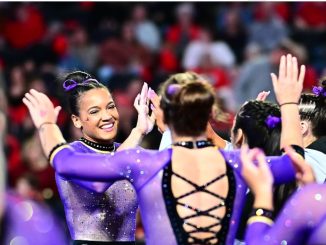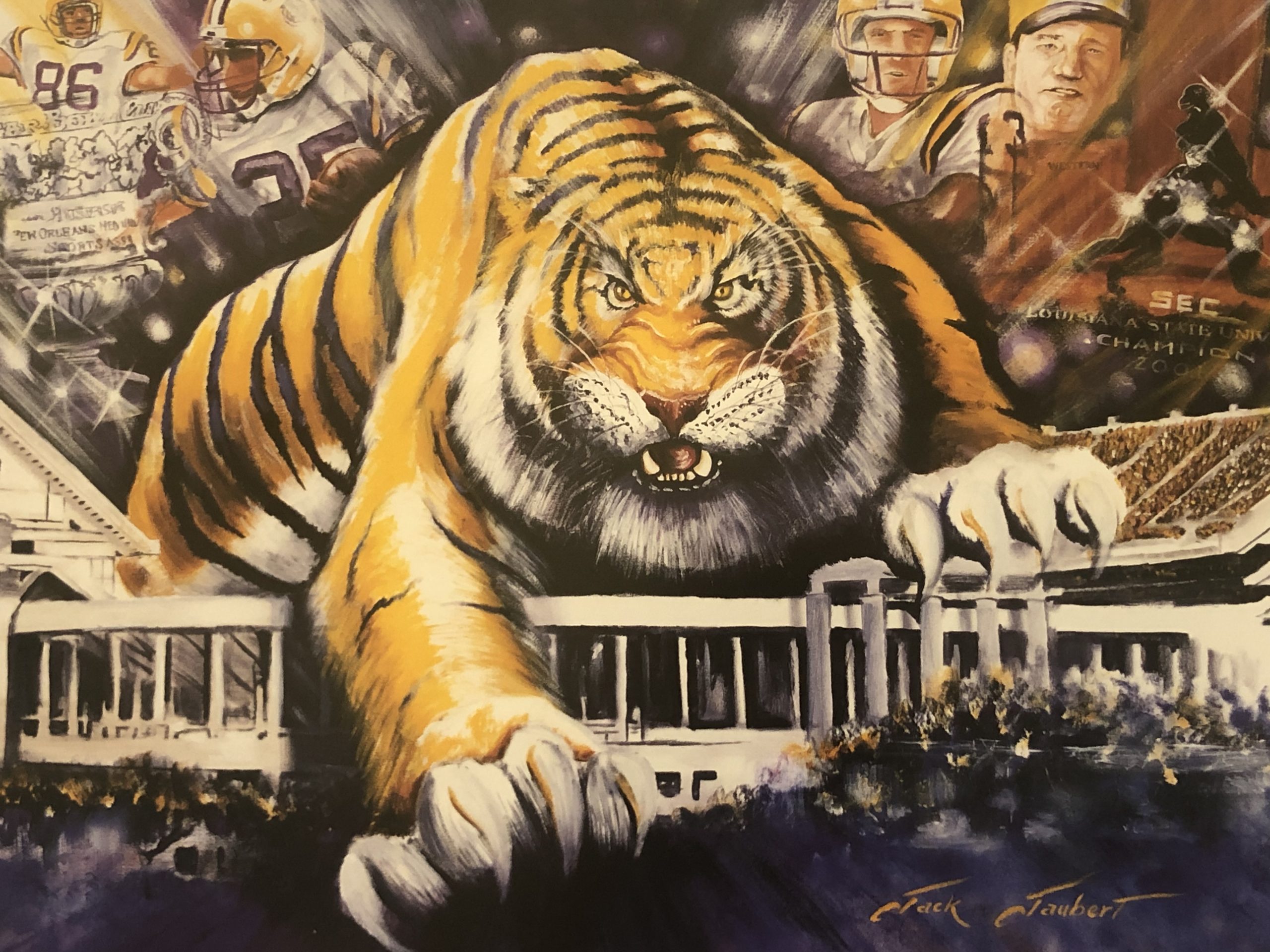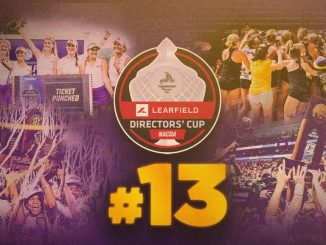It is my ritual at every LSU home football game.
Before entering the Paul Manasseh Press Box, named in honor of the school’s sports information director from 1971 to 1983, I stop briefly in front of a huge mural of him hanging just outside the entrance of the working press area.
I give Mr. Manasseh a couple of pats on his shoulder and repeat one of his favorite teaching mantras:
“Work smarter, not harder.”
Today, February 20, marks the 20th anniversary of Mr. Manasseh’s death at age 80.
Some days it seems that long ago and other times like yesterday when I enrolled in and eventually graduated from the Paul Manasseh School of Journalism.
That’s how I describe my time working as a student assistant in the LSU sports information office for one year through the summer of 1979 when Tiger Rag hired me a staff writer as it was beginning its second year.
Hands down, Mr. Manasseh was the best teacher I had at LSU.
A small sample size of other PMSOJ graduates (many of which remain top-notch journalists) under him at LSU and before that when he worked at Louisiana Tech are Steve Myers and Steve Townsend (the original Tiger Rag publisher and editor respectively), Nico Van Thyn, Danny Young, Gerry Poche, Joe Macaluso, Scooter Hobbs, Scott Ferrell, Glenn Guilbeau, Gil LeBreton, Jere Longman, Jim Kleinpeter, Nick Delaune, Andre Moreau, Carol Fenton Butler, Leslie Williams . . .the list goes on and on.
We – all his former student assistants – revered him so much that we always called him Mr. Manasseh. None of us ever felt comfortable calling him Paul, even after he requested such as we advanced in our careers.
He taught things that no professor could in LSU’s journalism school, which was barely hanging on to its accreditation in the late 70s.
“He was tough, exacting and he drilled us to be prepared with materials, answers and stats for the media we helped and the coaches we covered,” said Curry, a Washington Nationals fan services representative. “Being prepared is something you apply forever in whatever career path you choose. When you worked for Mr. Manasseh, you came away with life lessons that were golden.”
He also didn’t coddle his student assistants. He instilled a sense of professionalism.
“Mr. Manasseh created a workplace in which students could learn but also work under the expectation that they should perform like experienced, full-time employees,” said Vincent, SEC associate commissioner who also has served as LSU’s SID. “That environment made the transition from undergraduate work to full-time employment almost seamless upon graduation.”
He hated grammatical mistakes. He had an ironclad rule that no press release or publication would leave the sports information office without being proofread by at least two people.
Mr. Manasseh’s proofreading partner in crime was Butler, whose university job title was departmental information representative.
“My job was to read everything in our office that everyone wrote,” she said.
Well, that and instructing dimwit coaches on a daily basis how to use a copy machine.
Carol and Mr. Manasseh shared a passion for redundant phrases.
“Someone in our office once wrote `first annual’ and he went nuts,” Carol remembered. “Every time he saw the phrase he’d say, `What if nobody wants to do it again? Then there isn’t a first annual because there was never a second.’”
Another of Mr. Manasseh’s pet peeves was to get LSU referred to as “LSU” in first reference instead of Louisiana State, which was the Associated Press style at the time that USA Today also used.
“He even fired off a letter to USA Today that was addressed to `United States of America Today’ complaining about its style,” said Hobbs, long-time Lake Charles American Press sports editor and columnist. “Well, he finally won the battle. AP changed its style to let LSU be LSU.
“Not long after that, LSU basketball season started, and coach Dale Brown unveiled new uniforms — with `Louisiana’ above the numbers and `State’ below it. I think Mr. Manasseh said, not for the first time, `I wish Naismith had died in childbirth.’”
As much as a stickler Mr. Manasseh was about grammatical gaffes, he gave us leeway to make mistakes in learning certain tasks.
“One time in 1977, I covered an LSU football practice to write a release for area newspapers and other media outlets on what took place,” said Delaune, retired Kleinpeter Farms human resource director. “That day, Coach (Charles) McClendon revealed two new plays they were practicing to possibly use against Ole Miss the upcoming weekend. My faux pas was to describe the plays in detail for the article I wrote.
“Mr. Manasseh explained to me in a very fatherly way that could never happen again, or I would face dire circumstances. Then, he put me at ease as he always did and we laughed together.”
Kleinpeter, a former Times-Picayune LSU beat writer, made a couple of `duh’ mistakes on his first road trip as a baseball sports info student assistant and stat keeper when LSU played Ole Miss.
“I had no idea what my job entailed, other than keeping stats,” said Kleinpeter, who didn’t call the Advocate with information when the Saturday doubleheader was rained out as well as the next day when the teams played.
“Mr. Manasseh wasn’t mad. Instead, he told me it was his fault because he never sat down with me to go over what I was supposed to do.
“That might have been the first time I ever heard an adult say that. He accepted full blame. It made me feel better about working in his office.”
Ferrell, editor of the Shreveport Times, correctly assessed Mr. Manasseh’s people skills were “off the chart.”
“He seemingly knew everybody,” Ferrell said. “Yet he could make a student worker feel as important to the organization as Keith Jackson coming to town to call a football game. He developed such a wonderful work culture before people even knew to write books about work culture. Yes, the work could be hard. But it was just so much fun working for him.”
As student assistants, we knew he had our backs.
One day, Mr. Manasseh summoned me to his office. Waiting there was the head coach of one of the four sports I was assigned to publicize.
“This bio Ron wrote is unacceptable,” said the agitated coach, whose office I visited five times when he wanted more information added about his awards and his legacy.
“What’s wrong with it?” Mr. Manasseh asked.
“It’s too short, there’s not enough about me and my accomplishments,” the coach said indignantly.
“Here, let me see it,” said Mr. Manasseh, taking the typewritten bio from the coach.
Mr. Manasseh slowly flipped through the never-ending bio, perusing all 10 pages.
“You see the problem?” the coach said shooting a sideways glance at me.
“I sure do,” said Mr. Manasseh, who ripped off the last five pages, slowly tore them in half and dropped them at the coach’s feet. “It’s too damned long. Get out of my office.”
As the coach stormed away, Mr. Manasseh winked and told me with a grin, “OK, we’re done. Go back to work.”
I felt like million bucks, but Mr. Manasseh had a habit of making you feel like family.
“If you worked in that SID office, he basically adopted you for life, especially if you stayed in journalism or sports administration,” Hobbs said. “You’d be standing in a group at some open-bar social the night before a big game or event, chatting away with other writers and maybe a couple of school officials, when he’d appear from nowhere and barge into the circle.
“He’d interrupt whatever world problems were being solved to put his arm around your shoulder and with a big smile announce to the group `This is one of mine. One of my boys here.’
“Used to embarrass me sometimes, but I sure would like to get one more hug.”
We all would, Scooter. We all would.




Ron. You are a treasure, too
This article really brought tears —no wonder, I am Paul’s sister. Thank you so much for loving him like I still so!! Ruth Lewis ( here in Shreveport).